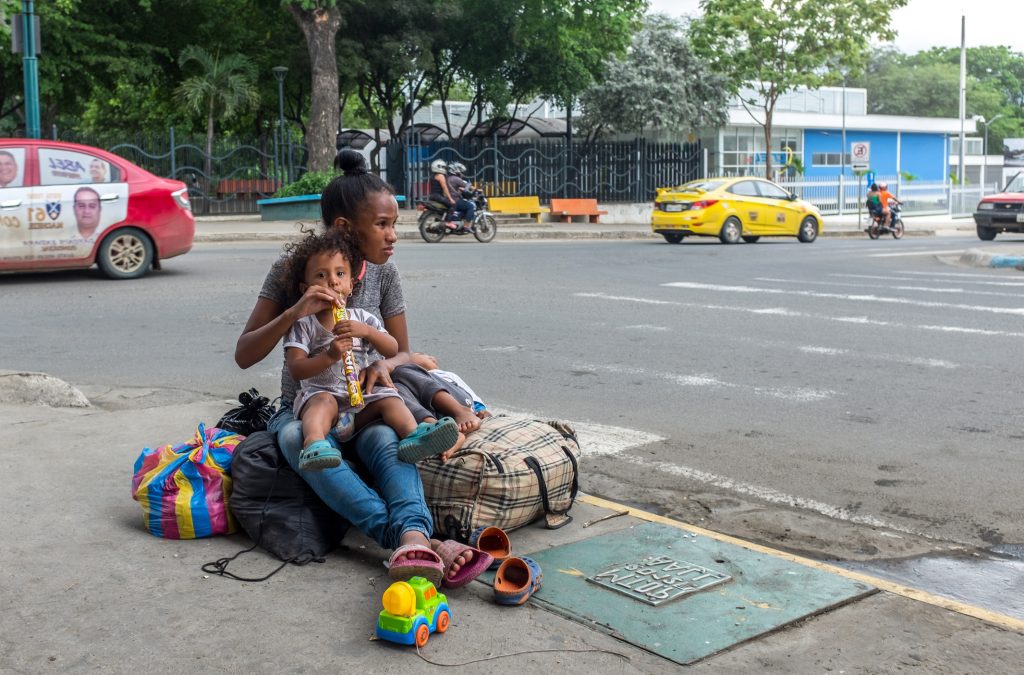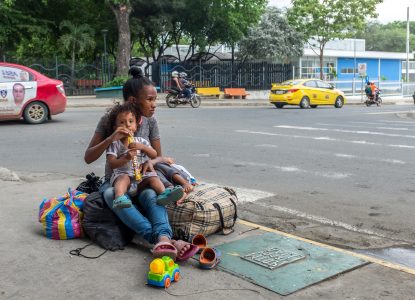By Elias Szczytnicki, Regional Secretary General for Religions for Peace in Latin America and the Caribbean
– – –
In this post, I am going to speak about the second-largest crisis of refugees and migrants in the world, which could very soon become the largest in the world. I am sure everyone has heard about it, but I sense that it doesn’t receive the same level of concern from others—perhaps because it is in Latin America and the Caribbean, a region of the world that is less strategic than the Middle East or South Asia.

The Venezuelan Refugee Crisis
In August of 2021, the Regional Interagency Coordination Platform for Refugees and Migrants of Venezuela, the UN platform that coordinates care for migrants and refugees from Venezuela, confirmed that more than six million people have left the country in recent years. The Coordination Platform estimates that five million of these refugees remain in Latin American and Caribbean countries. Only in Colombia, the UN has registered 2.1 million migrants, while Peru hosts around one million and Chile and Ecuador exceed 450,000.
Religions for Peace (RfP) has a long-standing commitment of multi-religious cooperation to promote the inclusion of refugees and migrants in all societies, dating back to 1970. Last year, the United Nations High Commissioner for Refugees (UNHCR) and RfP established the Multi-Religious Council of Leaders. It comprises more than 20 religious leaders, representing the diverse faith traditions of the world, committed to work together to address the root causes of forced displacement and help those forced to flee by promoting peacebuilding, conflict prevention, and social cohesion.
Efforts by Faith-based Organizations
RfP in Latin America and the Caribbean is improving the situation of refugees and migrants from Venezuela. Important examples of this response are the Interreligious Committee for Refugees and Migrants in Peru (CIREMI) and the Interreligious Roundtable for Solidarity with Migrants in Cali, Colombia. Refugees were the first community affected by the pandemic, and they almost immediately lost their informal jobs and began to suffer from hunger and evictions. For those on the move and in densely populated areas, physical distancing measures became almost impossible.
International organizations, such as the UNHCR and the International Organization for Migration (IOM), recognize the difference that faith-based organizations are making in the crisis. At critical junctures where governments and large organizations are slower to act, religious actors have the ability to actively help and meet immediate needs on the ground and, in addition, play a crucial role in public policy, integration and development.
Interreligious cooperation has facilitated the integration of community networks of shelters for refugees and migrants that provide hot meals and sometimes also lodging in places of transit and destination. These shelters also help refugee and migrant children without Internet to study virtually due to the pandemic. Catholic and Evangelical shelters receive support from other religious denominations, such as The Church of Jesus Christ of Latter-day Saints and the Jewish Community, and also from the Multi-Religious Humanitarian Fund of RfP. The support of UN agencies working together with RfP is also essential for these shelters.
Increasing Challenges Brought by the Pandemic
COVID-19 has subjected refugees and migrants from Venezuela to increased violence. Every risk that they were already facing has been exacerbated by the pandemic. Xenophobia is rising. Gender-based violence has increased. Border closures and controls have increased legal and practical complexities.
Access to documentation is the first critical step to promote the inclusion of this population. RfP is cooperating with governments and international organizations to guide the refugees and migrants from Venezuela with immigration advice.
In the midst of the crisis of the COVID-19 pandemic, refugees and migrants from Venezuela face multiple cases of xenophobia and discrimination, which concerns religious communities because they can grow and poison the environment against healthy integration in countries of transit and destination. Therefore, RfP is organizing, in partnership with other faith-based organizations, a conference on the role of religious communities in the fight against xenophobia and discrimination against refugees and migrants in Latin America and the Caribbean.
Conclusion
We can see the powerful results when religious organizations unite and collaborate with each other and with international organizations to help refugees and migrants from Venezuela. We hope that the recommendations of the G20 Interfaith Forum will consider the urgency of greater aid for interreligious cooperation in response to this crisis of refugees and migrants from Venezuela that could become the largest in the world in 2022.
– – –
Elías Szczytnicki serves as the secretary general of the Latin American and Caribbean Council of Religious Leaders (LACCRL) and the director of the Latin American and Caribbean Regional Office of Religions for Peace. As LACCRL Secretary General, Mr. Szczytnicki organizes high level meetings of religious leaders with important international personalities, including Pope Francis. He also represents the LACCRL in various meetings of the United Nations and their agencies.


